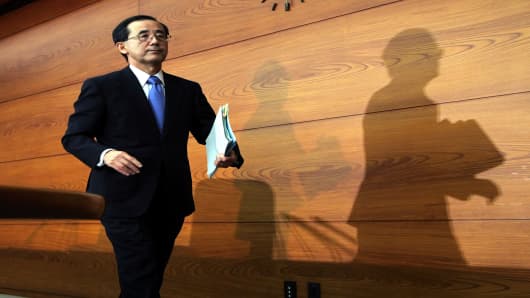Japanese stocks surged 4 percent to its highest level in more than four years on Wednesday, after the yen declined sharply on bets that a decision by the head of the Bank of Japan to step down early will bring forward aggressive monetary easing.
The Nikkei climbed 432.78 points to 11,479.70, its highest level in 52 months and was on track for its biggest one-day percentage rise since March 2011.
The yen slumped to 94 yen against the dollar, a low not seen for 33 months.
Bank of Japan Governor Masaaki Shirakawa said on Tuesday he would step down together with his two deputies, three weeks before the end of his five-year term.
Prime Minister Shinzo Abe has put the central bank under relentless pressure to do more to pull the economy out of the doldrums and made it clear that he wants a governor who will be bolder in loosening monetary policy.
"The new governor is expected to take strong easing steps, so him coming to power earlier will boost the market's hopes that the easing steps will come earlier too," said Tatsushi Shikano, senior economist at Mitsubishi UFJ Morgan Stanley Securities.
The governor's term was due to end on April 8, but his two deputies' are scheduled to leave on March 19. Shirakawa told reporters that he had informed Prime Minister Shinzo Abe about his decision to leave early so that his successor and the new deputies can start their roles at the same time.
"We are going to work out without delay the schedule of submission (of candidates) to parliament for swift approval," Akira Amari, economics minister in Abe's cabinet, told reporters.
Abe led his Liberal Democratic Party to a landslide victory in a December lower house election promising to revive the stagnant economy by coaxing the central bank into aggressive monetary stimulus and boosting government spending.
Last month, the BOJ signed a joint statement with the government adopting a new 2 percent inflation target as a sign of its commitment to fighting deflation. It also announceda shift to "open-ended" asset buying.
But many investors were disappointed that even in taking unconventional steps the BOJ displayed a caution that has characterised Shirakawa's term, delaying the "open ended" buying until next year and limiting its scope.
Like the U.S. Federal Reserve and the Bank of England, Japan's central bank has cut interest rates close to zero so that it has to use unorthodox measures to loosen policy further.
In the final months of his term, Shirakawa had to endure mounting political pressure for action as Japan's economy was slipping into its fourth recession since 2000.
But analysts took his decision to leave early as a genuine effort to smooth out the succession, rather than a final political statement.
"Governor Shirakawa is not a person who would leave his post in anger," said Yuichi Kodama, chief economist at Meiji Yasuda Life Insurance.
He said the outgoing governor was trying to simply bring the terms of the central bank chief and his deputies back into line. They fell out of synch when Shirakawa's appointment was delayed five years ago after parliament had rejected the first candidate.
While it is up to Abe's cabinet to choose the candidates, they will need parliamentary approval in both chambers of parliament, including the upper house where neither Abe's LDP nor any other party has a majority.
That means that both LDP's small coalition partner New Komeito party and opposition groupings will have some say in the process and all have been weighing into the debate on what sort of central bank governor Japan needed.
While most politicians agree that Japan needs someone prepared to take greater risks and crank up the printing presses to help snap Japan out of more than a decade of mild deflation, the contentious point are his or her background and qualifications.
(Read More: Japan Defends Stimulus, Yen Policy Under Fire)
The Democrats, who lost power to LDP in the December polls, say they want someone who could be his own boss and stand up to the government if needed, but suggested they would be flexible when it comes to specific demands.
Those close to Abe suggest he would prefer an academic willing to take radical steps. Some of the small parties have said they would not back a former bureaucrat, while others, say that on the contrary the position required experience in policymaking.
Among those mooted as prospects are Asian Development Bank President Haruhiko Kuroda, academic Kikuo Iwata, a harsh critic of the BOJ's present policy, and Toshiro Muto, a former finance ministry executive who served as deputy governor of the central bank until 2008.
The two incumbent deputies, career central banker Hirohide Yamaguchi and a former academic Kiyohiko Nishimura, have voted with the majority of the board and toed the BOJ's official line on monetary policy.


